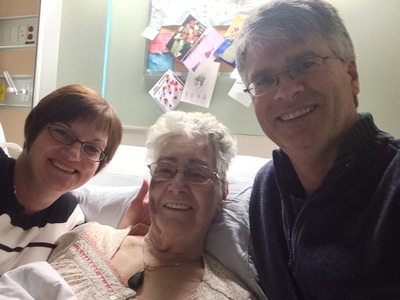Supportive Spouse or Caregiver

Having a supportive go-to person is critical when you are dealing with a crisis caused by chronic pain. It is not like it is the first time, and it won't be the last time you are asking them to be there for you. So to avoid burn out it is important to think about them while you are going through whatever the crisis is at the time, and before and after.
Here are some of the things I have learned:
1. Communication is number one, as it is in every relationship in life. Remember he or she cannot read your mind. Let them know clearly what is happening with you and what you are likely to need from them. ie. I feel a migraine coming on, I will need to go lie down. Would you mind keeping the house quiet for a couple of hours? And I was supposed to pick up the kids at school, would you please do that for me.
2. Do for yourself what you are able to. This one is a double edged sword. There are those of us who can't or won't ask for help when it is needed and those who can't stop ordering people around when they are sick. Chronic pain is different. It is for the long haul, so play your cards right. When you are having a good day, do what you can without over doing it, so that on the days you can't, you haven't worn out your caregivers.
3. Don't use the pain or illness to get out of things you would prefer not to do such as visit the in - laws. By all means if it is a bad day don't do anything that will make it worse but don't use it as an excuse when you are okay to do so. It is hard enough to get people to understand chronic pain, so faking it or exaggerating, is never allowed. It's okay to say I'm feeling good and have too much to do, but don't blame it on pain, if the pain is not there.
4. Remember it's not all about you. It may be hard to come out of yourself to try to fill the needs of others, but it is especially important to look after the needs of your caregiver. If there is something that is important to them make every effort for them to be able to do that. ie. My husband has a boy's weekend every year and I would move mountains to make sure he goes, no matter what is going on with me. There's always a way.
5. Remember your manners. I have seen people who are normally very nice and polite lose all manners when they are in pain and speaking to family and caregivers. Not good. It doesn't cost a cent and it is one or two words of polite kindness that can make all the difference. I often think some caregivers would do more for strangers than their family, however some being cared for would treat a stranger better than their caregiver, so do remember it is a two way street.
6. Have some fun!! We watch comedy, play cards, play games. All of those things help. Playing cards can be a struggle for me, standing sitting etc. but we do it until I can't.
7. Have a 'normal' life. This one is hard. But it is possible if you are willing. I have done some things that make me smile when I think of them. Last spring I was very sick with a kidney infection and had to go for daily I.V antibiotics. It was during fishing season, and we were missing the boat and the peace it brings. My husband suggested we go anyway and put the seats down in the boat so I could lie down. I agreed, we brought pillows and blankets. It turned out to be a wonderful day. I looked like hell, and could have easily curled up on the couch with my chills and pain, but it was the right decision. You just have to be open to it when you can.
8. Be honest. This one is kind of like communication, but I feel it deserves it's own post. If you know there is no way on earth you can do something, don't say maybe or let's wait and see, just say no and why. ie. I can't go to that party because the chairs are very hard and I won't be able to sit on them, and the band is always very loud so I can't be in that environment when I am in pain. I'm really okay with you going without me, if it is important to you. Can we have them over here for a drink before the party so I can see everyone?
9. Compromise is important. We just recently planned a trip and it wasn't what I would have chosen for myself, but I made it work. I live in a very active family. I joke that I am trapped in the wrong family. I need some T.V watching couch potato relatives! These people love to ski, run, hike, canoe, skate etc. If it is an activity, they love it and when they watch T.V watching football is their favorite. So a trip to the sun and beach was what I really wanted, but I compromised and went to Sedona and sat in the hot tub while they hiked. I did manage a short very beautiful hike . It was a great holiday.
10. Be patient. I cringe as I write that, because I am not a patient person and when I am in pain it is my worst trait. I want it done and I want it done now. Well guess what? That doesn't work. I am working on this one constantly.
So the bottom line is, if we are fortunate enough to live with caring, compassionate people remember the steps above. For those who think they are not living with caring compassionate people, look at the steps above and ask yourself honestly if you are doing them, if not try it out and see what happens.
Here are some of the things I have learned:
1. Communication is number one, as it is in every relationship in life. Remember he or she cannot read your mind. Let them know clearly what is happening with you and what you are likely to need from them. ie. I feel a migraine coming on, I will need to go lie down. Would you mind keeping the house quiet for a couple of hours? And I was supposed to pick up the kids at school, would you please do that for me.
2. Do for yourself what you are able to. This one is a double edged sword. There are those of us who can't or won't ask for help when it is needed and those who can't stop ordering people around when they are sick. Chronic pain is different. It is for the long haul, so play your cards right. When you are having a good day, do what you can without over doing it, so that on the days you can't, you haven't worn out your caregivers.
3. Don't use the pain or illness to get out of things you would prefer not to do such as visit the in - laws. By all means if it is a bad day don't do anything that will make it worse but don't use it as an excuse when you are okay to do so. It is hard enough to get people to understand chronic pain, so faking it or exaggerating, is never allowed. It's okay to say I'm feeling good and have too much to do, but don't blame it on pain, if the pain is not there.
4. Remember it's not all about you. It may be hard to come out of yourself to try to fill the needs of others, but it is especially important to look after the needs of your caregiver. If there is something that is important to them make every effort for them to be able to do that. ie. My husband has a boy's weekend every year and I would move mountains to make sure he goes, no matter what is going on with me. There's always a way.
5. Remember your manners. I have seen people who are normally very nice and polite lose all manners when they are in pain and speaking to family and caregivers. Not good. It doesn't cost a cent and it is one or two words of polite kindness that can make all the difference. I often think some caregivers would do more for strangers than their family, however some being cared for would treat a stranger better than their caregiver, so do remember it is a two way street.
6. Have some fun!! We watch comedy, play cards, play games. All of those things help. Playing cards can be a struggle for me, standing sitting etc. but we do it until I can't.
7. Have a 'normal' life. This one is hard. But it is possible if you are willing. I have done some things that make me smile when I think of them. Last spring I was very sick with a kidney infection and had to go for daily I.V antibiotics. It was during fishing season, and we were missing the boat and the peace it brings. My husband suggested we go anyway and put the seats down in the boat so I could lie down. I agreed, we brought pillows and blankets. It turned out to be a wonderful day. I looked like hell, and could have easily curled up on the couch with my chills and pain, but it was the right decision. You just have to be open to it when you can.
8. Be honest. This one is kind of like communication, but I feel it deserves it's own post. If you know there is no way on earth you can do something, don't say maybe or let's wait and see, just say no and why. ie. I can't go to that party because the chairs are very hard and I won't be able to sit on them, and the band is always very loud so I can't be in that environment when I am in pain. I'm really okay with you going without me, if it is important to you. Can we have them over here for a drink before the party so I can see everyone?
9. Compromise is important. We just recently planned a trip and it wasn't what I would have chosen for myself, but I made it work. I live in a very active family. I joke that I am trapped in the wrong family. I need some T.V watching couch potato relatives! These people love to ski, run, hike, canoe, skate etc. If it is an activity, they love it and when they watch T.V watching football is their favorite. So a trip to the sun and beach was what I really wanted, but I compromised and went to Sedona and sat in the hot tub while they hiked. I did manage a short very beautiful hike . It was a great holiday.
10. Be patient. I cringe as I write that, because I am not a patient person and when I am in pain it is my worst trait. I want it done and I want it done now. Well guess what? That doesn't work. I am working on this one constantly.
So the bottom line is, if we are fortunate enough to live with caring, compassionate people remember the steps above. For those who think they are not living with caring compassionate people, look at the steps above and ask yourself honestly if you are doing them, if not try it out and see what happens.



